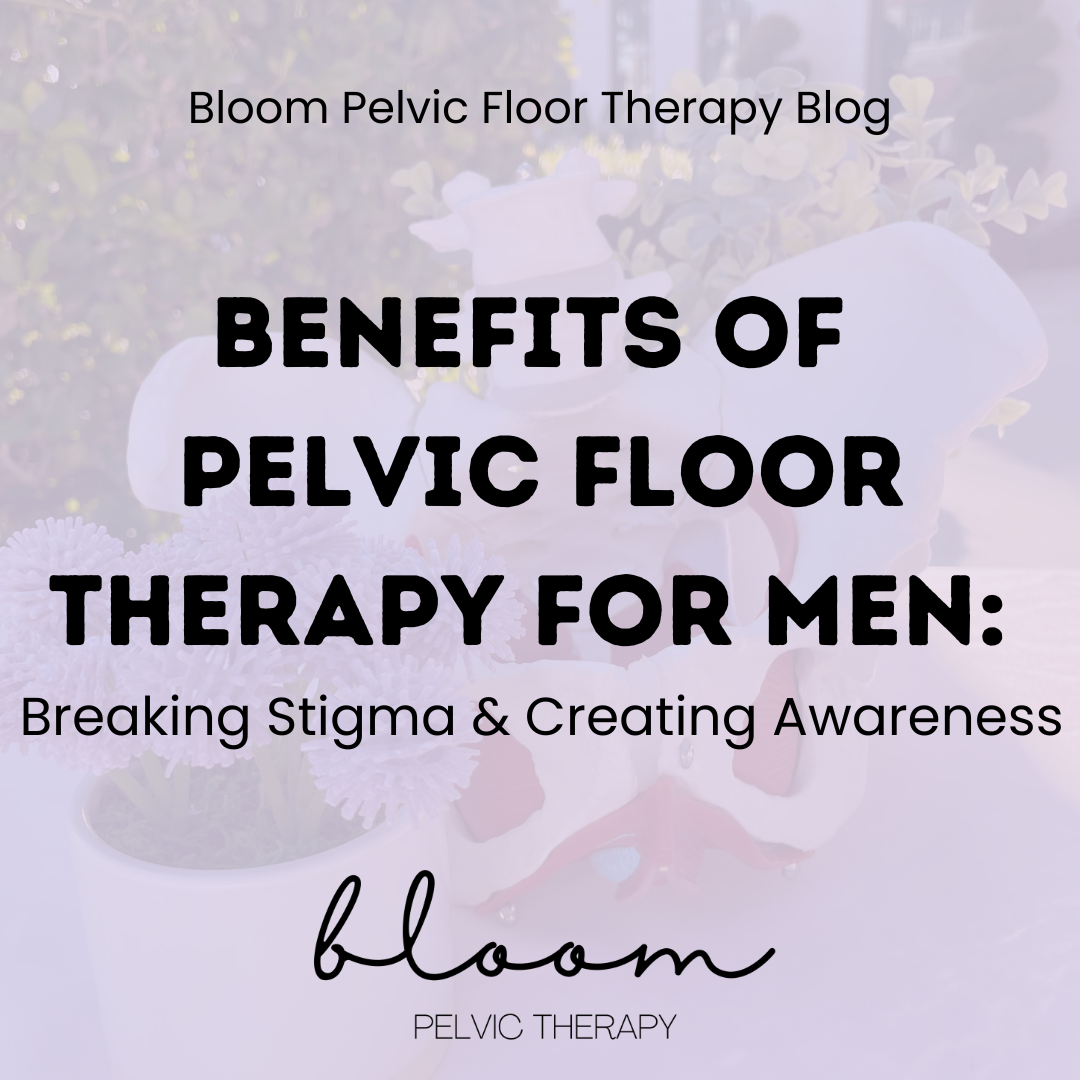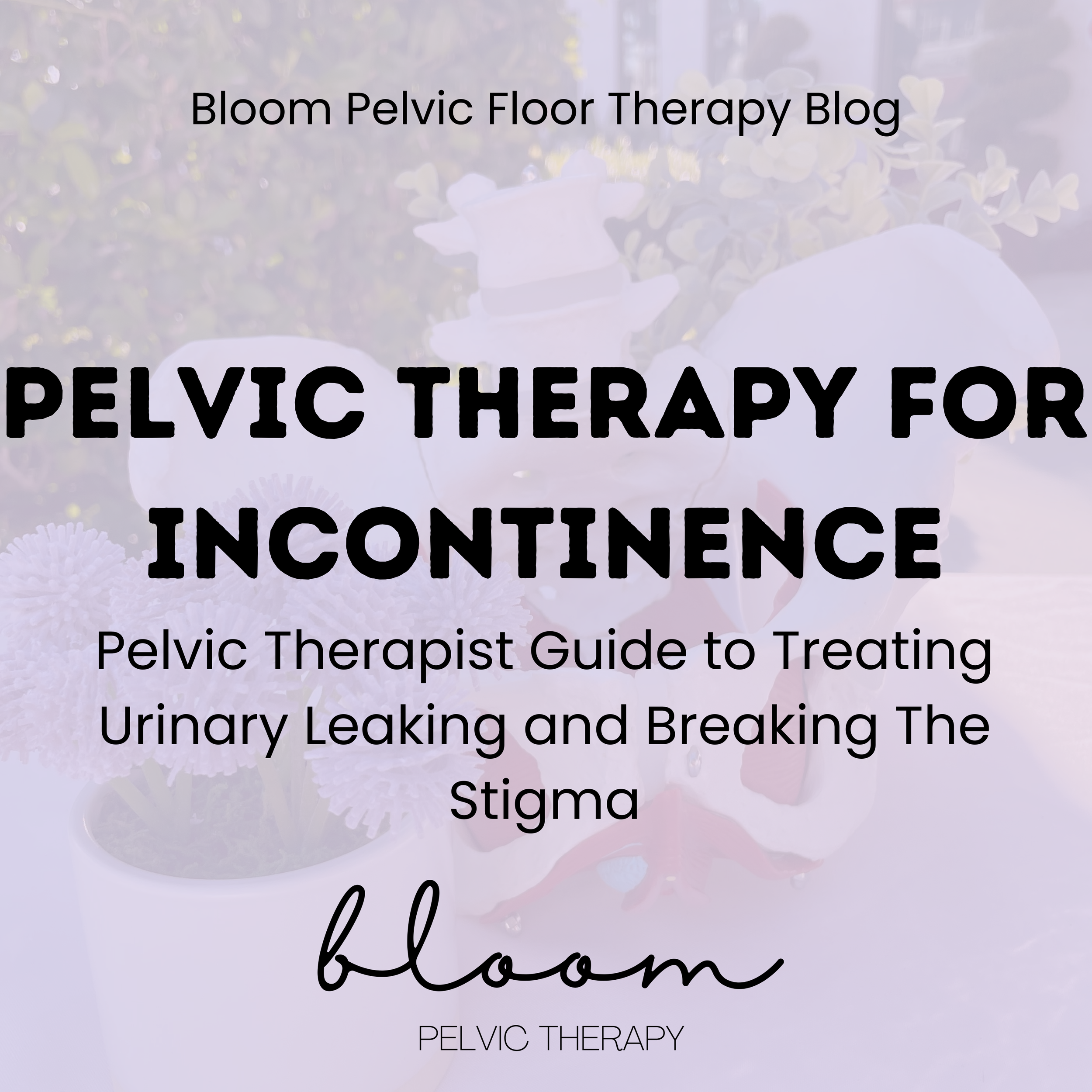Bloom Blog
There is so much power in knowledge-even more so concerning our bodies and health. Bloom Pelvic Therapy has a strong passion for educating all, for better pelvic outcomes! Here’s to better pelvic health for all!

Pelvic Pain During Pregnancy: PGP And SPD And What to Do About It
Pelvic girdle pain (PGP) is a common pelvic pain condition in pregnancy, affecting 1 in 5 pregnant women. While pelvic pain is very common in pregnancy, it does not have to be accepted as normal or as par for the course. Relief from pelvic pain in pregnancy is possible with adequate diagnosis and treatment with a skilled pelvic floor therapist.
Some experts consider PGP an umbrella term for pain specific to the bony structures and joints of the pelvis, which covers other more specific diagnoses, such as symphysis pubis dysfunction (SPD). Some sources explain PGP to previously have been called SPD, which more specifically describes pain stemming from dysfunction at the joint at the front and center of the pelvis – the pubic symphysis joint.
No matter which stage you are in, there is relief from pelvic pain. We are here to meet you where you are and help you feel your best during all of life’s phases. At Bloom Pelvic Therapy, we work with clients experiencing PGP, SPD, and SI joint pain daily and are experts in decreasing pelvic pain and improving quality of life. Connect with a team member at 813-515-9008 to discuss if we would be a good fit for you!

Pelvic Pain During Your Period: 5 Things That Can Help
Period pain and cramping is all too often dismissed in our youth and continues to be normalized as we age. Women do not all experience menstrual periods and associated pelvic pain the same. For some, the pain may be the worst the first few days, and for others, it may last the whole time or ramp up near the end. Some may describe their pelvic pain and cramping as debilitating, causing them to need to take off from school or work, while others may have mild-moderate pain and are able to continue daily activities for the most part, albeit uncomfortably. Some may experience minor or very little pain or cramping on their periods, which really is what should be considered normal. Say it with me – Bad period pain is not normal.

Pelvic Pain After Sex: Why and What To Do
Pain with sex, often referred to in the medical world as dyspareunia, can feel and present differently depending on the person. The pain may occur at entry, with deeper penetration, afterwards, during certain positions, or any combination of these. When the pain is specifically after sex, this may be called postcoital pain.
Strategies to decrease or eliminate this pain are dependent upon why it is occurring in the first place. By determining the root cause through pelvic floor therapy and medical team collaboration, your pelvic pain during or after sex can be more optimally treated to make sure sex is both pleasurable and comfortable--during and after!
We work with clients experiencing pelvic pain and related concerns regularly and are here to support you in getting the relief you deserve.

Pelvic Pain Causes and Treatment Options
Many individuals with pelvic pain struggle to find answers and relief. Early diagnosis and treatment with a supportive medical team can be game changing for managing pelvic pain -- but how do we get there when no one seems to understand what is going on with you and what is causing your pain?
We are here to help uncover the mystery of under-discussed pelvic pain and how to start treating it using a collaborative approach. It is never too late to find answers and start getting the relief you deserve.
Pelvic pain can feel and present differently for everyone, even with people that end up having the same diagnosis. For some, pelvic pain can start strong and be brief while in others, pelvic pain onset can be more gradual, persistent, or seem to linger with possible fluctuations for 6 months or more.
Common symptoms of people dealing with pelvic pain may include pain in the vulva, vagina, or anal area that some may describe as stabbing, shooting, burning, aching, itching, or irritating. It could present as painful sex or penetrative intercourse, inability to wear a tampon, feels like hitting a wall, or hypersensitivity or pain with clitoral stimulation (direct or indirect). Pain can also occur mainly when sitting or with prolonged standing. while wearing underwear or pants. At times this pain could be seemingly random or that is brought on only when provoked (i.e., penetration, touching the area, exercise) or only co-occurring abdominal pain and bloating or bowel health concerns, such as constipation.

Benefits of Pelvic Floor Therapy for Men: Breaking Stigma & Creating Awareness
Pelvic floor therapy is not just for women; men also have pelvic floors and can experience dysfunction. While it often receives attention for women, particularly those who are pregnant, this represents only a small portion of those served. Pelvic floor health is crucial for everyone, including men.
Benefits of pelvic floor therapy for men can include: improved bladder control, urgency, or complete emptying, decrease in constipation or improved bowel control, recovery from surgery, such as prostatectomy, pelvic pain relief, improved sexual health and wellness, improved quality of life

What Is a Pessary?: A Pelvic Floor Therapist's Perspective
Pessaries are a strong conservative option for people of any age with symptoms of pelvic organ prolapse (POP) or stress urinary incontinence (SUI). Pessaries are medical-grade devices typically made of silicone that are inserted into the vagina to support the position of pelvic organs as well as the urethra. Fitting, placement, and wearing of pessaries are minimally invasive and can provide significant support and relief of prolapse symptoms and reduction of urinary leakage from SUI.
Pessaries help to prevent worsening of prolapse over time and help to provide a sense of relief right away and while wearing the pessary. Pessaries work by providing the just-right support for your specific anatomy and your type and stage of prolapse to decrease symptom bother and get you back to doing the things you love that you have been worried to do for fear of worsening symptoms. Wearing a pessary could help decrease the need for surgery if you are a surgical candidate or help to prevent you from becoming one because you are supporting your connective tissue more effectively against gravity. The support is provided and symptom resolution or reduction is present when wearing the pessary, though may return when the pessary is removed.

How to Start Pelvic Floor Therapy: 5 Steps to Jumpstart Your Journey
You are wanting to start pelvic floor therapy but unsure of where to begin. You are thinking about making more time for self-care, prioritizing yourself for once, and putting an end to your pelvic health concerns. You may be seeking out pelvic floor therapy after being encouraged by a friend, referred by a doctor, or heard about it from social media. Regardless of what brought you here, we are glad you are here. Getting started is the hardest part. We are here to make it a little easier.

How to Manage Pelvic Health Issues During the Holidays
The holiday season brings laughter, dietary fluctuations, changes in routine, and sometimes stress. In the hustle and bustle of all the festivities, your pelvic floor may be the last thing getting any attention, yet the demands we place on ourselves and our bodies are often greater this time of the year than ever. Let's unpack the common holiday mishaps when it comes to pelvic health and how to get ahead of the curve.

Constipation & Urgency: A Pelvic Floor Therapist's Guide
Pelvic floor therapy is increasingly recognized for treating bowel concerns, but understanding its role and finding solutions can be challenging. Support is available for those seeking help -- we are here for you!

What is Bladder Health? Is this bladder irritation IC/BPS?!
Many things can contribute to your overall bladder health -How much water you drink, what you consume, how you use the bathroom, and if you are pushing down and pressuring the bladder all affect the function and health of your bladder and urinary functions! I know--So much more than we were ever taught!
Many people that experience bladder discomfort, frequent irritation, or discomfort with urination take to Google and Reddit, ending up panicked over the possibility of IC/BPS. Don’t fret- we have helped many people walk this journey- and can often eliminate symptoms before needing to go for testing. American Urological Association gives the highest efficacy rating to pelvic floor therapy in dealing with symptoms, above most medications or procedures.

Finding the Root Cause: Can Hormones Be Responsible for Your Pelvic Pain?
Many people are shocked to hear that our hormones have anything to do with pelvic pain while others find this to be no surprise. Let’s level the playing field. Many people are shocked to hear that our hormones have anything to do with pelvic pain while others find this to be no surprise. Let’s level the playing field. Now just because you identify with one of the life phases or medication history listed does not mean you 100% have or will have pain anywhere in your vulva or vagina. However, there are a large number of people that do and will. This discrepancy may be due to other factors, such as our personal biology. We strongly believe that building an awareness of how our bodies work can help set the stage for wellness throughout the lifespan, help us with asking productive questions at doctor’s visits, and support our medical decision making throughout all of life’s transitions.

Pelvic Therapy for Incontinence: Treating Urinary Leaking and Breaking The Stigma
Have you ever wondered why so many women opt for black leggings at the gym? We never wondered either until we became pelvic floor therapists. Now, all we can see is a sea of black leggings whenever we walk into a HIIT class, barre, yoga, or our favorite studio. Many people will shy away from lighter, colored leggings or pants for fear of possible urinary leakage during their workout. Some people say they cannot tell if they’ve leaked or are just sweating, so they wear a darker color just to be safe. As pelvic floor therapists, we are all about helping you feel like you do not need to live your life “just playing it safe.” Let’s pull the cobwebs off those Lululemon leggings in the bottom of the drawer and get you feeling your best – wearing whatever you want, whenever you want.

Restoring Pelvic & Sexual Health After Cancer Treatments
When it comes to cancer, pelvic floor therapy is often the last thing on someone’s mind. This often holds true until a cancer survivor is perhaps trying to reestablish intimacy or a sex life with their partner after invasive medical treatments, tremendous stress, role changes from partner to caregiver and back to partner, bladder and bowel fluctuations, and immense bodily changes through treatment and healing. This is often when we get the call from clients that are going through this experience, wondering if this is where they should turn next for support. If you are curious if pelvic floor therapy can help you at your stage in your cancer journey, the answer is yes! We would be honored to share more information on how we can help.

Back to the Not-So-Basics: What Is a Vulva?
The question we hear perhaps the most often is different versions of, “Why does it hurt down there?” Many women are rather unfamiliar with their own anatomy when it comes to their vagina and vulva. The vulva often gets breezed right over or is not discussed at all until there is some sort of issue. Many women are not aware that the vulva consists of the external structures of the female genitalia, while the vagina is the canal that leads up to the cervix. There are many different areas of the vulva, which we will outline below in hopes of improving understanding for not just when there is an issue or things go wrong, but for when we want things to go right!

How to Treat Interstitial Cystitis/Bladder Pain Syndrome (IC/BPS)
If you are living with IC/BPS or symptoms of this condition, we first and foremost want you to know that you are not alone. IC used to only be diagnosed following a cystoscopy confirming Hunner’s lesions in the bladder. However, we now know that you can have valid symptoms and diagnosis of IC/BPS without having these lesions on the bladder. In fact, your bladder can look completely “fine” on a cystoscopy and you could still have IC/BPS if you meet the symptom criteria described above. This is the case for the majority of people with IC/BPS! Many people with this condition actually have pelvic floor dysfunction driving their symptoms and not bladder lesions or pathology. This may help you to understand why pelvic floor therapy is a primary treatment approach as listed in the AUA guidelines for IC/BPS.

Why Do I Have Pelvic Pain?
There is so much more than meets the eye when it comes to pelvic pain. One thing that can be extremely helpful in the path towards healing pelvic pain is gaining an understanding of the pain cycle. This can help to affirm that “No, it is not all in your head!” There is a very real physiological reason for your pelvic pain.
Sometimes what started as a seemingly unrelated incident, such as a fall on your tailbone in childhood, could have set the stage for pelvic floor pain and issues down the line that maybe did not encroach on your daily life until another incident (childbirth, menopause, a hip injury, etc.) brought it to light. It could even be years later when it seems like suddenly all of your pelvic pain began when truly you may be experiencing or noticing the tip of the iceberg when the foundation has been crafted over the past several years. Once you add the pain cycle into that mix, the challenge may seem insurmountable to overcome.

It Feels Like Something is Falling Out: Will Pelvic Floor Therapy Help Me?
So often we hear our clients concerned about feeling or seeing a bulge down there, at times clients report the sensation of something “falling out”. Yes- pelvic therapy helps prolapse! Yes- you can avoid surgery for most cases of prolapse! Our pelvic floor physical and occupational therapists are well-versed in Pelvic Organ Prolapse or POP, and can help!

Pelvic Floor Therapy Near Me: How to Find a Pelvic Floor Therapist
Navigating the search for a pelvic floor therapist can feel overwhelming. Whether referred by a doctor or inspired by social media, the process involves sifting through options and evaluating credentials. At Bloom Pelvic Therapy, our dedicated team specializes solely in pelvic floor care, ensuring expert treatment tailored to your needs. Discover what sets us apart and why personalized, attentive therapy is crucial for reclaiming your quality of life.

How to Stop Incontinence: Does the Emsella Chair Really Work?
Discover the causes and symptoms of urinary incontinence (UI) and effective (and ways to stay away from) in treating your urinary leaking. Kegels? Emsella? Whole Body Movement?- What is the right thing to do?! We answer all the questions and point you in the right direction.

Feels like you’re hitting a wall during sex?
Dyspareunia causes penetration to be painful, especially in the beginning or with movement. For some people, pain associated with vaginismus is mild. For others, it is unbearable. This could be experienced during intimacy, when inserting a tampon, or during medical pelvic exams. It is possible to experience pain with sex but not have trouble with a tampon, each person is different.
